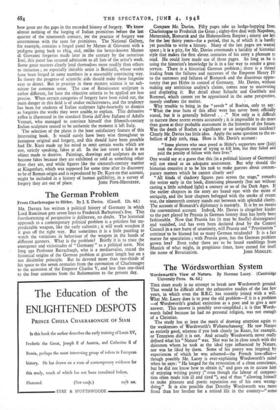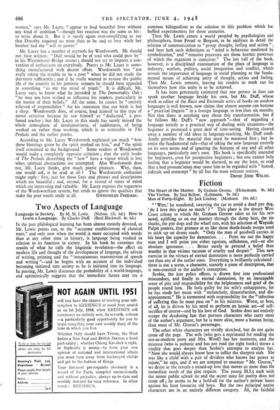The WOrdsworthian System
Wordsworth's View of Nature. By Norman Lacey. (Cambridge University Press. 8s. 6d.)
THIS short study is no attempt to break new Wordsworth ground. That would be difficult after the exhaustive studies of the last few years, in which even the B.B.C. has recently joined with a will. What Mr. Lacey does is to pose the old problem—if it is a problem —of Wordsworth's gradual extinction as a poet and to give a new answer. This answer is possibly over-simplified ; it is that Words- worth failed because he had no personal religion, was not enough of a Christian.
The study has at least the merit of drawing attention again to the weaknesses of Wordsworth's Weltanschauung: He saw Nature as entirely good, whereas if you look closely (as Keats, for example, or Tennyson did) it is not. And actually Wordsworth never really defined what his "Nature" was. Nor was he in close touch with the dalesmen whom he took as the ideal type influenced by Nature, nor was he liked by them. Some of his poetry was inspired by experiences of which he was ashamed—the French love-affair- though possibly Mr. Lacey is over-explaining Wordsworth's mind when he says : "He longed for the restoration of a clean conscience, but he did not know how to obtain it," and goes on to accuse him of enjoying writing poetry (" even though the labour of composi- tion often made him ill and tired "), and of thus "allowing himself to make pleasure and poetic reputation out of his own wrong- doing." It is also possible that Dorothy Wordsworth was more fitted than her brother for a retired life in the country—" some women," says Mr. Lacey, f` appear to lead beautiful lives without ' any kind of ambition "—though her reaction was the same as his : to write about it. But it is surely again over-simplifying to say that Dorothy required no more than to be and to love while her brother had the "will to power."
Mr. Lacey has a number of reproofs for Wordsworth. He should not have written: "Dull would he be of soul who could pass by" in his Westminster Bridge sonnet • should not try to impress a con- vention of enthusiasm on everybody. Poetry to Mr. Lacey is some- thing manufactured with decent effort. Wordsworth was "not really taking the trouble to be a poet" when he did not study the dalesmen sufficiently ; and if he really wanted to restore the public life or the country in his patriotic sonnets he should have appealed to something "to stir the mind of youth." It is difficult, Mr. Lacey says, to know what he intended in The Immortality Ode ; "he may not have wished to influence his readers, particularly in the matter of their beliefs." All the same, he cannot be "entirely relieved of responsibility" for his statement that our birth is but a sleep. Wordsworth does, of course, lend himself to this type of moral criticism because he saw himself • as "dedicated," a pro- found teacher ; but Mr. Lacey in this study has surely missed the whole atmosphere of involuntariness, of suddenness, of being worked on rather than working, which is so noticeable in The Prelude and the earlier poems.
According to Mr. Lacey Wordsworth explained too much "how these blessings given by the spirit worked on him," and "the spirit itself remained in the background." Some readers of Wordsworth would make a completely opposite criticism ; that the early books of The Prelude describing the " how " have a vigour which is lost when spiritual abstractions are attempted. Also Wordsworth does not, Mr. Lacey thinks, give much poetic pleasure. Why, then, one would ask, is he read at all ? The Wordsworth enthusiast might reply : first, just for those lines and phrases and descriptions which are beautiful ; and, second, for a record of states of mind which are interesting and valuable. Mr. Lacey exposes the vagueness of the Wordsworthian system, but tends to ignore the qualities that



































 Previous page
Previous page